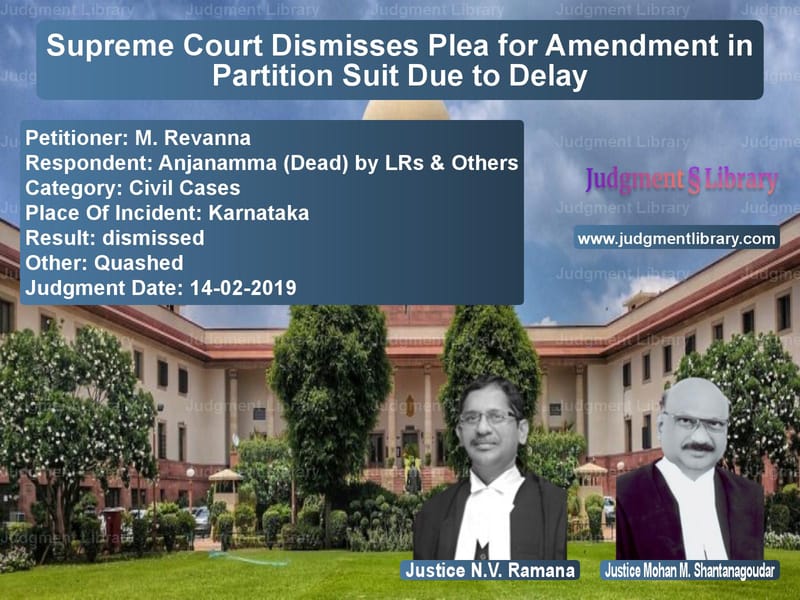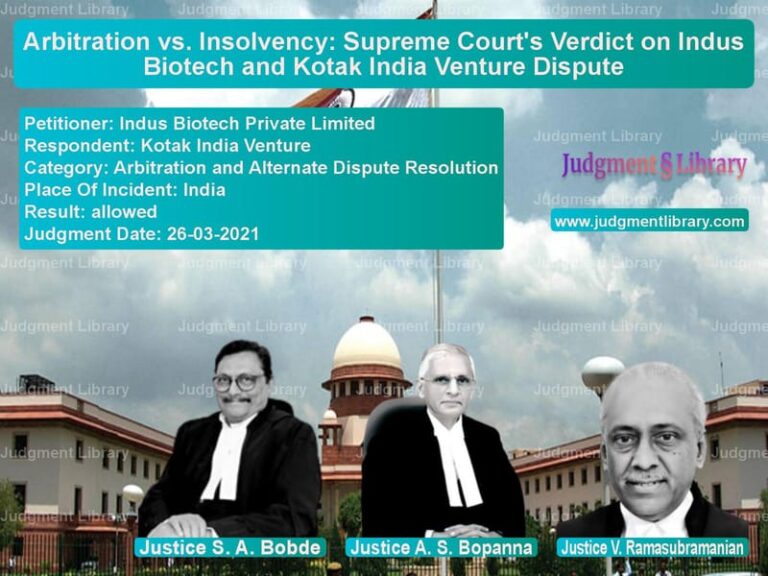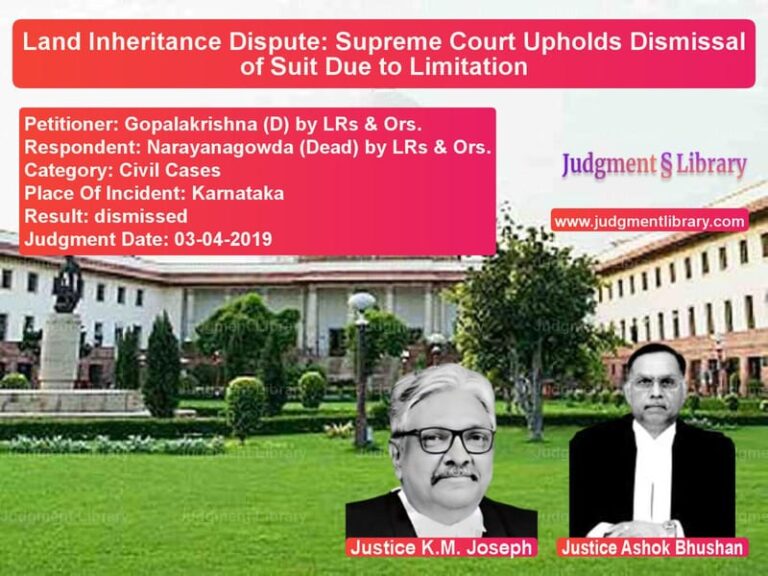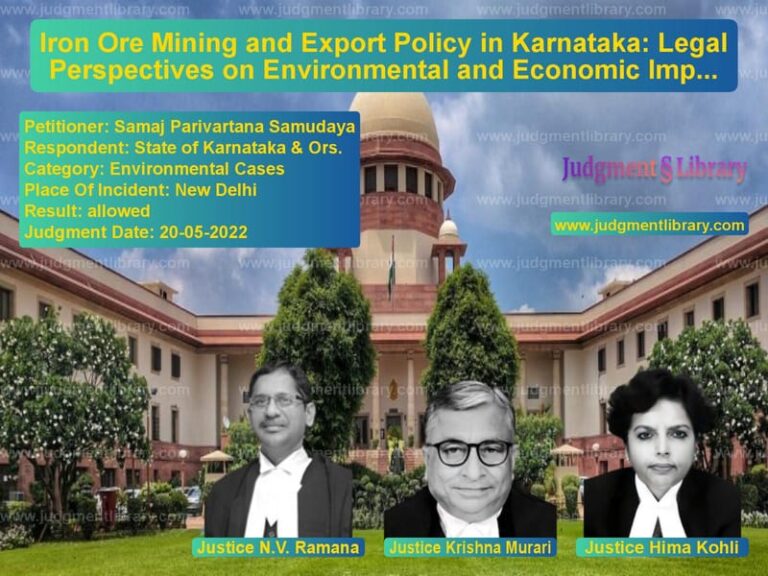Supreme Court Dismisses Plea for Amendment in Partition Suit Due to Delay
The Supreme Court of India, in the case of M. Revanna vs. Anjanamma (Dead) by LRs & Others, ruled on the rejection of an amendment application in a partition suit. The judgment addresses the impact of delayed amendments and the importance of procedural diligence in civil litigation. The Court upheld the Karnataka High Court’s decision, affirming that an amendment filed belatedly, after years of litigation, cannot be entertained.
Background of the Case
The dispute involved a suit for partition and separate possession of joint family properties. The plaintiff, M. Revanna, along with others, filed a suit (O.S. No. 2611/1993) in the Karnataka Trial Court, seeking partition of ancestral properties. The plaintiffs claimed a 1/6th share each in the properties.
Initially, the suit was filed against three defendants. Shortly after their appearance in court, the plaintiffs and defendants entered into a compromise agreement, claiming that the properties had already been divided as per a memorandum of partition dated May 18, 1972. A compromise petition was filed in the Trial Court on April 22, 1993, seeking the dismissal of the suit.
However, other family members (Defendants 4 to 6) who were left out of the suit opposed the compromise. They argued that the family properties were still undivided, and the suit should proceed to determine the rightful shares of all legal heirs. The Trial Court dismissed the suit based on the compromise petition on June 4, 1994.
Defendant No. 6 challenged the dismissal before the Karnataka High Court in RFA No. 297/1994. The High Court, after hearing the matter, set aside the Trial Court’s order and restored the partition suit, directing the Trial Court to decide the case on merits.
After remand, Defendant No. 6 was transposed as Plaintiff No. 6. While the suit proceeded, Plaintiff Nos. 1 to 5 did not produce evidence for a long period, delaying the case. Eventually, Plaintiff No. 6 adduced evidence on July 2, 2003, and was cross-examined. Plaintiff No. 1 attempted to testify as PW-2 but did not make himself available for cross-examination for four years. The Trial Court discharged him from examination in 2007. However, after repeated adjournments, he was cross-examined on February 12, 2008.
On September 1, 2008, Plaintiff Nos. 1 to 5 filed an amendment application (I.A. No. 22) under Order VI Rule 17 CPC, seeking to modify the plaint by introducing the claim that a prior partition had already taken place in 1972. Defendant No. 6 (Plaintiff No. 6 after transposition) and other contesting defendants opposed this application, arguing that:
- The application was highly belated and filed after a delay of 15 years.
- The amendment was not bona fide and was meant to frustrate the suit.
- The plaintiffs had earlier admitted that partition had not taken place, and now they were trying to change their stance.
The Trial Court allowed the amendment on November 14, 2008, but this order was challenged before the Karnataka High Court.
High Court’s Decision
The Karnataka High Court quashed the Trial Court’s order and rejected the amendment application, reasoning that:
- The plaintiffs had failed to show due diligence in seeking the amendment earlier.
- The amendment sought to alter the nature of the suit at the final stage of trial.
- The delay in filing the amendment was unjustified, as the plaintiffs had ample opportunity to raise the issue earlier.
Dissatisfied with the High Court’s ruling, Plaintiff No. 1 (M. Revanna) appealed before the Supreme Court.
Supreme Court’s Analysis and Judgment
The Supreme Court examined the following legal aspects:
1. Delayed Amendment and Due Diligence
The Court emphasized the importance of Order VI Rule 17 CPC, which states that amendments should not be allowed after trial commencement unless due diligence is shown. The Court observed:
“The proviso to Order VI Rule 17 CPC curtails absolute discretion and mandates that post-trial amendments must be backed by due diligence.”
The Court held that Plaintiff Nos. 1 to 5 had no justification for waiting until 2008 to seek an amendment regarding a purported 1972 partition.
2. Admission in Pleadings
The plaintiffs had earlier admitted that partition had not occurred, and the suit was filed for partition and separate possession. The amendment sought to introduce a contradictory plea, stating that partition had already taken place in 1972.
The Court ruled:
“The proposed amendment contradicts the plaintiffs’ original stand. Allowing such an amendment at this stage would amount to permitting the plaintiffs to withdraw their admission, causing prejudice to the defendants.”
3. Prejudice to Opposing Parties
The Supreme Court highlighted that if the amendment were allowed, Plaintiff No. 6 would suffer serious prejudice as he had been pursuing the case based on the original pleadings.
The Court ruled:
“An amendment that changes the fundamental nature of the suit and prejudices the contesting defendants cannot be allowed.”
Final Judgment
- The Supreme Court dismissed the appeal, affirming the Karnataka High Court’s decision.
- The Trial Court’s order allowing the amendment was quashed.
- The case was directed to proceed on the original pleadings.
Key Takeaways from the Judgment
- Amendment of Pleadings Must Be Filed on Time: The ruling reinforces that amendments sought at the final stage of trial require strong justification.
- Due Diligence is a Key Factor: Courts will not allow amendments unless the applicant demonstrates that the issue could not have been raised earlier.
- Contradictory Pleas Cannot Be Introduced: A party cannot be permitted to alter its original admissions and take a completely different stand.
- Amendments Should Not Prejudice Opposing Parties: If an amendment adversely affects the rights of other litigants, courts will be reluctant to grant it.
Conclusion
The Supreme Court’s ruling in M. Revanna vs. Anjanamma (Dead) by LRs & Others is a landmark judgment on the principles governing amendments in civil suits. By upholding the Karnataka High Court’s rejection of the amendment, the Court reinforced the importance of procedural diligence and the principle that pleadings cannot be modified at will, especially at the final stage of litigation.
Petitioner Name: M. Revanna.Respondent Name: Anjanamma (Dead) by LRs & Others.Judgment By: Justice N.V. Ramana, Justice Mohan M. Shantanagoudar.Place Of Incident: Karnataka.Judgment Date: 14-02-2019.
Don’t miss out on the full details! Download the complete judgment in PDF format below and gain valuable insights instantly!
Download Judgment: M. Revanna vs Anjanamma (Dead) by Supreme Court of India Judgment Dated 14-02-2019.pdf
Direct Downlaod Judgment: Direct downlaod this Judgment
See all petitions in Property Disputes
See all petitions in Succession and Wills
See all petitions in Judgment by N.V. Ramana
See all petitions in Judgment by Mohan M. Shantanagoudar
See all petitions in dismissed
See all petitions in Quashed
See all petitions in supreme court of India judgments February 2019
See all petitions in 2019 judgments
See all posts in Civil Cases Category
See all allowed petitions in Civil Cases Category
See all Dismissed petitions in Civil Cases Category
See all partially allowed petitions in Civil Cases Category







